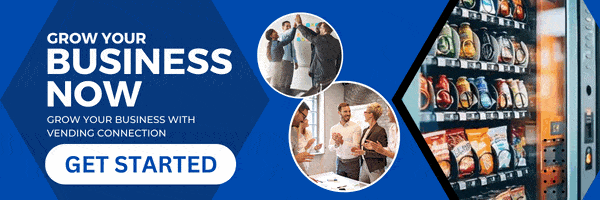Driverless Vehicles: How And When Will They Impact Vending And Refreshment Services?
 Driverless vehicles are no longer a fantasy. What’s not certain is how long it will be before they are considered safe to use on a large scale. When that time arrives, there’s no question they will bring significant benefits to service industries like vending and refreshment services.
Driverless vehicles are no longer a fantasy. What’s not certain is how long it will be before they are considered safe to use on a large scale. When that time arrives, there’s no question they will bring significant benefits to service industries like vending and refreshment services.
Which is why Canteen, the nation’s largest vending and refreshment services provider, has been studying this new technology. Scott Denhard, president of the North Carolina Vending Association and vice president of franchise business development for Canteen, offered an overview about the benefits driverless vehicles will bring to vending and refreshment services at this year’s Atlantic Coast Expo in Myrtle Beach, S.C.
“How does this impact the efficiency of our operations?” Denhard asked. “What is the impact going to be three to five years from now?”
Canteen has looked at driverless vehicles from both the consumer’s and the company’s vantage points, Denhard said. Once driverless vehicles are in use, the convenience dining industry will be using them. The vehicles will be part of a business model in which food manufacturers deliver product to distributors, who send them to convenience service operators, who deliver them to locations that make them available to consumers.
And what exactly is a self-driving vehicle? While there is no “official” definition, Denhard said the U.S. government, in exploring how to regulatrre such vehicles, has adopted the Society of Automotive Engineers’(SAE) six levels.
The six levels are as follows, according to the SAE website.
- No automation. The driver performs all the driving.
- Driver assistance. The driver controls the vehicle, but the vehicle design includes some driving assist features.
- Partial automation. The vehicle has combined automated functions, such as steering and acceleration, but the driver has to be engaged in the task of driving at all times.
- Conditional automation. The driver is needed, but not required to monitor the environment. The driver is, however, required to be able to take control of the vehicle without notice at all times.
- High automation. The vehicle can perform all driving functions under specific conditions, but the driver has the option to take control of the vehicle at any time.
- Full automation. The vehicle can perform all driving functions under all conditions, while the driver may still be able to take control.
Government regulations for driverless vehicles are still being developed, he said.
Meanwhile, some companies are already making use of vehicles that are partly automated, Denhard said.
Kroger has deployed driverless vehicles for making grocery deliveries to people’s homes, he noted, while Postmates has been developing delivery vehicles to transport products from one building to another.
Domino’s Pizza in the U.K. has tested driverless pizza delivery vehicles, Denhard said.
In addition, Ford and Dominos are testing a Ford Fusion in the U.S. that uses self-driving technology and an oven that can prepare and deliver a pizza, according to CNN. Once the vehicle arrives at its destination, the customer enters a number on a touchpad on the vehicle, prompting a back window to lower, allowing the customer to pick up their pizza.
Meanwhile, Denhard noted that Uber has used driverless vehicles for delivering Budweiser beer.
Anheuser-Busch InBev NV and Uber in 2016 jointly announced the first self-driving truck to make a commercial shipment when an 18-wheelvehicle drove more than 120 miles with the driver in the back, according to Bloomberg.
Denhard said driverless vehicles will have a significant impact on long haul delivery for companies like Canteen. He said such vehicles represent a potential $131 billion cost savings. The impact on the driver is the most interesting aspect of driverless vehicles, he said, especially in regard to deliveries between company terminals.
By Jeff Adair, Editor
![]() Vending Technology News | More News | Vending Newsletter sign up | Questions? Contact us | email press release
Vending Technology News | More News | Vending Newsletter sign up | Questions? Contact us | email press release
Also see: Software Companies | Technology Companies | Micro Markets | Cashless Vending | Distributors | Classified Ads | Routes for sale | Vending Companies USA | Home |
VENDING YELLOW PAGES DIRECTORIES:
Call us at 1-800-956-8363, POST YOUR COMPANY




